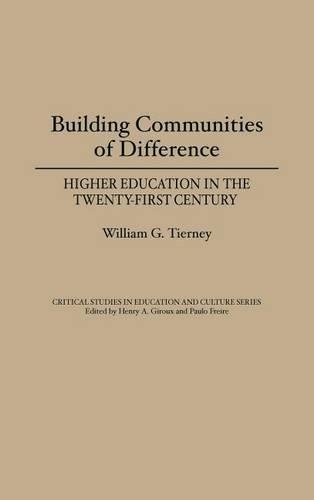
Building Communities of Difference: Higher Education in the Twenty-First Century
(Hardback)
Available Formats
Publishing Details
Building Communities of Difference: Higher Education in the Twenty-First Century
By (Author) William G. Tierney
Bloomsbury Publishing PLC
Praeger Publishers Inc
26th April 1993
United States
Classifications
Tertiary Education
Non Fiction
Higher education, tertiary education
378
Physical Properties
Hardback
184
Description
Higher education is in a time of crisis--diminishing funds, rising costs, lack of student preparation for college work, low morale among students and faculty, strained relations between faculty and administration, and confusion about curriculum and educational goals. Tierney believes that the problems are moral. He suggests that by following principles used by Gandhi and Martin Luther King, institutions of higher learning can model themselves on communities of brotherly love and service to humanity. Tierney presents several case studies of postsecondary institutions and shows how academic structures give privilege to some ideas and constituencies, and silence others. He weds critical theory to postmodernism to derive a workable orientation toward multiculturalism on campus. Tierney's rare book embraces critical theory and honors postmodernism simultaneously. It is about academe but it is accessible by the layman. Through a series of ethnographic case studies of postsecondary institutions, the author uses critical postmodernism to offer a series of practical solutions to some of the most vexing problems of education. Tierney's goal is to orient college life toward multiculturalism. Tierney takes the essence of critical theory and distills the core ingredients of postmodernism. He makes them work together in order to identify the difficulties in perceiving and reacting to the inner and outer workings of the human psyche. Critical postmodernism addresses five axes of contention: boundaries versus border zones, individual constraints versus pluralist possibility, political versus apolitical, hope versus nihilism, and difference versus agape, or generalized love. Ethnographic studies follow the theory: Deep Springs College in the California desert, a school with 26 students and seven faculty; gay faculty in academe; a private liberal arts college with a student body of 2,000 and a faculty of 150 cast in the traditional mode of higher education; private college engaged in strategic planning in the Northeast; and the creation of the San Marcos campus of California State University. The study concludes with a discussion of cultural citizenship and educational democracy and endorses the methods of ethnography as essential to refining perception and suggesting ways of improving the college experience.
Reviews
. . . provides a brilliant and thought-provoking analysis of present and future organizational cultures in higher education. If our communities of higher education have been built on homogeneity, then how in the future shall they be built on difference'' Tierney helps answer this compelling question by leading us from new theoretical scaffolding--combining postmodernism and critical theory--to 12 propositions that delineate specific steps for developing communities of difference.-Educational Record
The book is well written and moving, and will be of interest to a broad variety of readers. Upper-division undergraduates; graduate students; faculty.-Choice
"The book is well written and moving, and will be of interest to a broad variety of readers. Upper-division undergraduates; graduate students; faculty."-Choice
." . . provides a brilliant and thought-provoking analysis of present and future organizational cultures in higher education. If our communities of higher education have been built on homogeneity, then how in the future shall they be built on difference'' Tierney helps answer this compelling question by leading us from new theoretical scaffolding--combining postmodernism and critical theory--to 12 propositions that delineate specific steps for developing communities of difference."-Educational Record
Author Bio
WILLIAM G. TIERNEY is Associate Professor in the College of Education and Senior Research Associate in the Center for the Study of Higher Education at Pennsylvania State University. He is the author of four books, including Curricular Landscapes, Democratic Vistas (Praeger, 1989) and the editor of many more.
